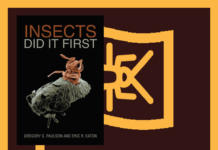The Earth is losing its pollinators.
All scientific research points in the general direction of habitat loss and the use of neonicotinoid pesticides throughout the world as the chief suspects in the decline of much of the world’s insect populations, especially pollinators like butterflies and bees.
Europe itself noted a 75% decline in insect populations in recent years, and you would think that the European Union would at least acknowledge this and help take steps to turn the numbers around and see an increase in the insect populations once again.
We need the bugs, folks. We the people, and our planet need the bugs. Especially the pollinators. Without them, all life on Earth will cease to exist in short order.
It wouldn’t be pretty.
But what does the European Union do? They approve the union of two of the most…I don’t even know the right words…these corporations are “poisoners”…they are poisoning this planet. And in my opinion, need to be dialed back in the pesticide department, not given more rope with which to hang us.
You should see what they have done to the beautiful Garden Island of Kauai. Despicable.
The earth’s pollinators are in trouble and will continue to be further imperiled until somebody does something. But is anybody doing anything to save the pollinators?
Yes, there are people doing something, quite a few, including yours truly. But they aren’t unified globally. Which is something I have personally been working on…more to come on that…
~ Cricket Man
Meanwhile:
The chief suspect in this mass extinction is the aggressive use of neonicotinoid pesticides, particularly imidacloprid and clothianidin, both made by the Germany-based chemical giant Bayer. These pesticides, along with toxic glyphosate herbicides such as Roundup, have delivered a one-two punch to monarch butterflies, honeybees and birds. But rather than banning these toxic chemicals, on March 21 the EU approved the $66 billion merger of Bayer and Monsanto, the U.S. agribusiness giant that produces Roundup and the genetically modified (GMO) seeds that have reduced seed diversity globally. The merger will make the Bayer-Monsanto conglomerate the largest seed and pesticide company in the world, giving it enormous power to control farm practices, putting private profits over the public interest.















